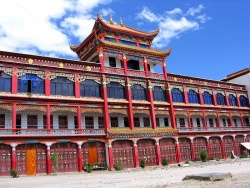Difference between revisions of "Kandze Monastery"
(Created page with "thumb|250px| Kandze Monastery (also Ganzi or Garze Monastery or Gompa) is situated 2 km north of Garzê Town on a hilltop overlooking the town, i...") |
m (Text replacement - "The Buddha" to "The Buddha") |
||
| (4 intermediate revisions by one other user not shown) | |||
| Line 1: | Line 1: | ||
[[File:Ganzi-monasterio.jpg|thumb|250px|]] | [[File:Ganzi-monasterio.jpg|thumb|250px|]] | ||
| − | Kandze Monastery (also Ganzi or Garze Monastery or Gompa) is situated 2 km north of Garzê Town on a hilltop overlooking the town, | + | Kandze [[Monastery]] (also Ganzi or [[Garze Monastery]] or Gompa) is situated 2 km north of Garzê Town on a hilltop overlooking the town, [[In Tibet]]. |
== History == | == History == | ||
| − | The | + | The [[Monastery]] was built c. 1642 CE by the Khoshut or Qosot Mongols overlooking their castles known as Mazur and Khangsar. It once housed 1,500 [[Monks]] making it, with Chamdo, the largest in [[Kham]]. The [[Pilgrimage]] circuit around the [[Monastery]] was almost eight kilometres long. In the 1909-1918 [[War]] the castles were occupied by Chinese troops and are now in ruins. |
| − | It has been extensively renovated since 1981 and now houses about 700 | + | It has been extensively renovated since 1981 and now houses about 700 [[Monks]], including three tulkus - one of whom returned from Switzerland and established a girls' school. |
== Description == | == Description == | ||
| Line 15: | Line 15: | ||
The main Assembly Hall is striking building with a golden roof from which there is a magnificent view of the valley and nearby town. It is approached by a long flight of stairs and the inner sanctum is reached though long passageways formed by red wooden columns. | The main Assembly Hall is striking building with a golden roof from which there is a magnificent view of the valley and nearby town. It is approached by a long flight of stairs and the inner sanctum is reached though long passageways formed by red wooden columns. | ||
| − | Inside three sets of images are displayed high up in glass cabinets representing the founders of the Nyingmapa, Kadampa and Gelugpa lineages. There are also a number of fine tangkas representing the meditational | + | Inside three sets of images are displayed high up in glass cabinets representing the founders of the [[Nyingmapa]], [[Kadampa]] and [[Gelugpa]] lineages. There are also a number of fine tangkas representing the meditational [[Deities]], [[Guhyasamaja]], [[Cakrasamvara]], and Yamantaka.[4] |
| − | === Maitreya Hall=== | + | === [[Maitreya]] Hall=== |
| − | The Maitreya Hall contains a huge image of Jampa (Maitreya), | + | The [[Maitreya]] Hall contains a huge image of Jampa ([[Maitreya]]), The [[Buddha]]-to-come, flanked by images of [[Shakyamuni]], [[Tsongkhapa]], [[Dipamkara]] and [[Sitatapatra]]. |
=== Other rooms === | === Other rooms === | ||
| − | Upstairs is a library containing the Kangyur and old images of the eleven-faced | + | Upstairs is a library containing the Kangyur and old images of the eleven-faced [[Form]] of [[Avalokiteśvara]] and the great Gelupa [[Teacher]], [[Je Tsongkhapa]] (1357–1419). There is also Gonkhang room dedicated to the guardian [[Deities]] mentioned above which is entered through spectacular black and gold door, and recently-painted images of protector [[Deities]]. |
| − | To the northeast of the | + | To the northeast of the [[Monastery]] on a hill is a reconstructed white [[Chorten]] ([[Stupa]]). |
{{W}} | {{W}} | ||
| Line 33: | Line 33: | ||
[[Category:Buddhist monasteries in Sichuan]] | [[Category:Buddhist monasteries in Sichuan]] | ||
[[Category:Buddhist Terms]] | [[Category:Buddhist Terms]] | ||
| + | [[Category:Mahayana Monasteries]] | ||
| + | [[Category:Mahayana Monasteries]] | ||
Latest revision as of 16:59, 12 September 2013
Kandze Monastery (also Ganzi or Garze Monastery or Gompa) is situated 2 km north of Garzê Town on a hilltop overlooking the town, In Tibet.
History
The Monastery was built c. 1642 CE by the Khoshut or Qosot Mongols overlooking their castles known as Mazur and Khangsar. It once housed 1,500 Monks making it, with Chamdo, the largest in Kham. The Pilgrimage circuit around the Monastery was almost eight kilometres long. In the 1909-1918 War the castles were occupied by Chinese troops and are now in ruins.
It has been extensively renovated since 1981 and now houses about 700 Monks, including three tulkus - one of whom returned from Switzerland and established a girls' school.
Description
Assembly Hall
The main Assembly Hall is striking building with a golden roof from which there is a magnificent view of the valley and nearby town. It is approached by a long flight of stairs and the inner sanctum is reached though long passageways formed by red wooden columns.
Inside three sets of images are displayed high up in glass cabinets representing the founders of the Nyingmapa, Kadampa and Gelugpa lineages. There are also a number of fine tangkas representing the meditational Deities, Guhyasamaja, Cakrasamvara, and Yamantaka.[4]
Maitreya Hall
The Maitreya Hall contains a huge image of Jampa (Maitreya), The Buddha-to-come, flanked by images of Shakyamuni, Tsongkhapa, Dipamkara and Sitatapatra.
Other rooms
Upstairs is a library containing the Kangyur and old images of the eleven-faced Form of Avalokiteśvara and the great Gelupa Teacher, Je Tsongkhapa (1357–1419). There is also Gonkhang room dedicated to the guardian Deities mentioned above which is entered through spectacular black and gold door, and recently-painted images of protector Deities.
To the northeast of the Monastery on a hill is a reconstructed white Chorten (Stupa).

